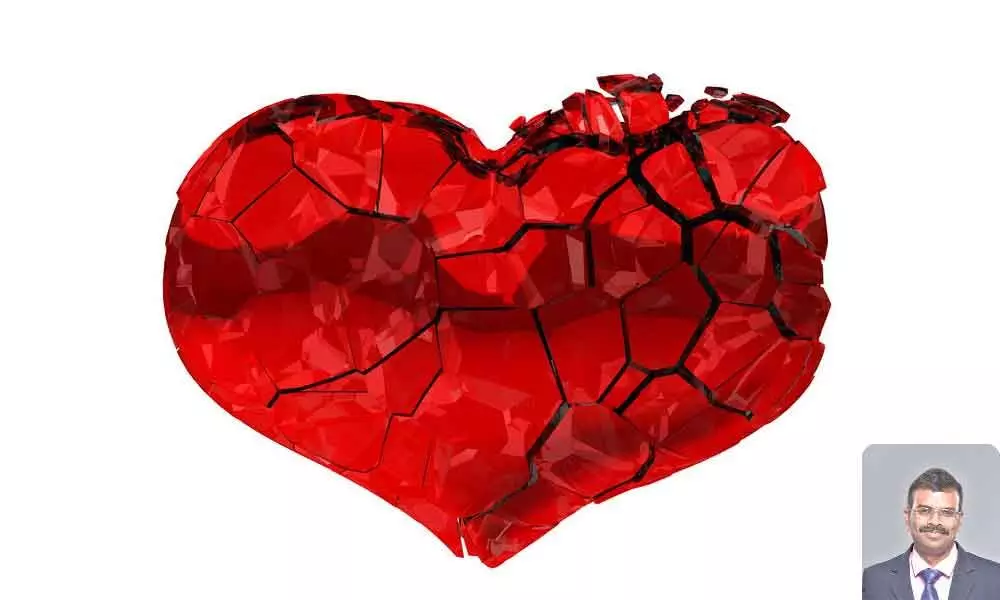Broken heart syndrome – a heart attack-like event caused by stress

Broken heart syndrome
Broken heart syndrome also termed stress cardiomyopathy or takotsubo cardiomyopathy is a silent heart attack-like event caused by sudden physical or emotional stress.
Broken heart syndrome also termed stress cardiomyopathy or takotsubo cardiomyopathy is a silent heart attack-like event caused by sudden physical or emotional stress.
The condition often mimics the symptoms of a heart attack and people sometimes misunderstand it as a real heart attack. The condition causes weakening of the heart's main chamber, the left ventricle, the chamber that pumps oxygenated blood to the body causing the bottom of the heart to stop beating, pushing the top part of the heart to beat faster.
Broken heart syndrome is a temporary heart condition that disrupts the heart's normal pumping function which further leads to symptoms like sudden chest pain, breathlessness, sweating, dizziness similar to a heart attack.
In this condition, there is a lack of blood supply in the body which is usually considered acute heart failure. The heart may not pump efficiently for two to four weeks but usually reverses itself and returns to its normal functioning within two months.
Broken heart syndrome is a stress-induced heart condition, which begins as soon as minutes or as long as hours after an emotionally or physically stressful event. Both emotional (grief, intense fear, anger) or physical stress (high fever, stroke, seizure, sudden drop in the blood pressure, a sudden accident) can lead to the sudden development of this condition.
Stress and the heart are interlinked. Overwhelming stress can trigger the body to produce hormones and proteins such as adrenaline and noradrenaline that are meant to help cope with the stress.
However, a sudden excessive amount of adrenaline in the body can cause narrowing of the small arteries which can lead to a temporary decrease in blood flow to the heart. Moreover, stress can also contribute to unhealthy habits like smoking, drinking or overeating which can cause an adverse effect on heart health.
Even though the symptoms are temporary and it is rare to develop severe complications, people can still experience blockage and rupture of the left ventricle, heart failure, cardiogenic shock (a condition where the heart suddenly stops pumping enough oxygen-rich blood to your body), atrioventricular block and even death.
Generally, in heart attacks, there is a blockage of arteries due to blood clots. In broken heart syndrome, the arteries are not blocked but there is a reduction of blood flow in the arteries.
Some of the known risk factors of broken heart syndrome are sex of the individual, age, prior neurological problems, and history of cardiovascular disease.
The condition affects more women than men. They are more common among post-menopausal women. People above 50 are prone to develop this condition. People who have neurological disorders like head injury, epilepsy and psychiatric disorder have a greater risk of broken heart syndrome.
Medical literature reports reveal that broken heart syndrome occurs in about 2% of patients who were seen with a suspected heart attack. Also, someone who had broken heart syndrome has a one in five chance of developing the condition.
The treatment for broken heart syndrome is just supportive and medications can maintain BP and saturation. The condition usually stabilises after a month.
The key requirement is to manage stress. Since a broken heart is the result of stress, managing stress by indulging in activities to relieve worry, stress, and anxiety are vital.
(The author is a Sr. Consultant, Interventional Cardiology, Aster CMI Hospital)











